PlumX and Bepress Digital Commons and Selected Works
PlumX Dashboards integrates with both Digital Commons (an institutional repository) and Selected Works (a profile system) both maintained by bepress, allowing us to populate your PlumX Dashboard with:
- Your organizational hierarchy (only Digital Commons)
- Your publications (which we call “artifacts” in PlumX) (both Digital Commons and Selected Works)
- Usage from your bepress sites (both Digital Commons and Selected Works)
- Researcher profiles (Selected Works by default or with Author Search URLs for DigitalCommons)
We can support sites with both DC and SW, or only one or the other.
Organizational Hierarchy Replication
One of the first things we will do is evaluate your Digital Commons community list/organizational hierarchy to determine if the HTML is in a format we currently support. If the HTML code is not yet supported we will work with our development team to support your implementation.
Once we bring in your organizational hierarchy you will be able to compare the metrics for each level of the hierarchy against each another (i.e., compare the College of Agriculture and Life Sciences to the College of Geosciences). You’re able to compare them through the Subgroups Overview Report in PlumX Dashboard. The Subgroups Overview provides a view into each subgroup for your organization across our five metrics categories, creating a powerful benchmarking opportunity.
The subgroups report is purposely generically named and is based on where in the hierarchy you are currently located. It is often best used at least one level down from the highest level in your PlumX subgroups to get you the closest to comparing “like to like.” For example, the following top-level subgroups:
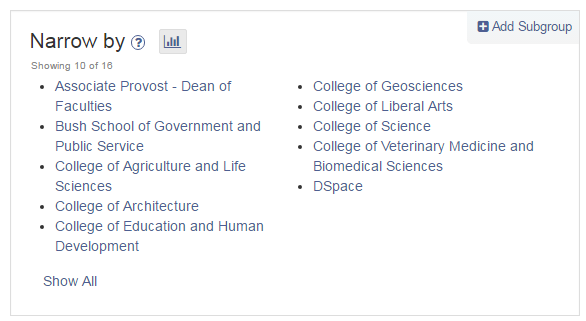
Each of these subgroups has their own subgroups below them, so a common use case would be to explore the results for each, such as for “Schools and Programs.”
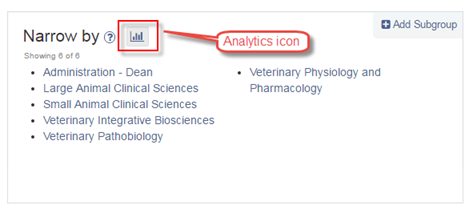
After navigating to that level, the next step would be to click on the Analytics icon and then click on Subgroups Overview to see the results. For the Usage category, the Veterinary Integrative Biosciences group has the most usage compared to the other schools in that college:
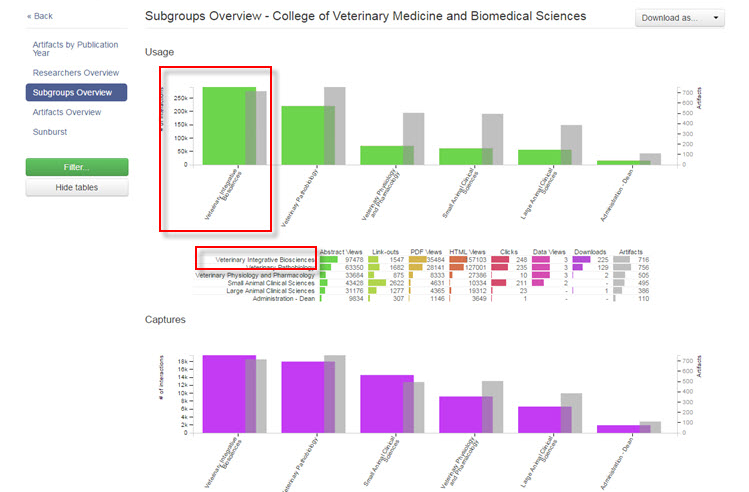
Repository Harvesting
The most popular method for bepress resource integration is web crawling. We also support OAI-PMH with the default metadata prefix oai-dc. If there are DOIs with your content, we determine if they are in the expected field (which we will provide you with) to harvest them.
Content Type Mapping
If we are crawling your bepress sites, the following HTML is where the document type value is expected to appear.
<div id='document_type' class='element'> <h4>Document Type</h4> <p>Conference Proceeding</p></div> |
If we are harvesting via OAI-PMH, the dc:type mapping will be used.
| Document Type value (from HTML) | dc:type (from OAI-PMH) | PlumX ArtifactType |
|---|---|---|
| article, press OR if bepress_citation_journal_title meta tag is provided |
article, journal, contributionToPeriodical | ARTICLE |
| contribution, chapter, contribution to book OR if bepress_citation_inbook meta tag is provided |
chapter, bookPart | BOOK_CHAPTER |
| book | book, libro, monograph, proceeding | BOOK |
| conference, conference proceeding OR if bepress_citation_conference meta tag is provided |
conference, conferenceobject, conference paper, conferencepaper | CONFERENCE_PAPER |
| paper, unpublished | cassignment, discussion paper, monografia, ponencia, researchPaper, student research paper, working paper | PAPER |
| presentation | presentation, lecture | PRESENTATION |
| poster | poster | POSTER |
| report | report | REPORT |
| dissertation, thesis | dissertation, thesis | THESIS_DISSERTATION |
| other | N/A | OTHER |
Usage Statistics
PlumX Support wil ask you to contact your Bepress support rep and ask for PlumX’s new Bepress account be granted Reports access. (Your implementation coordinator will inform you as to what the Bepress account credentials are.) Support will then log into the Bepress Reports Dashboard and run usage reports to be emailed to PlumX support. Due to the manual nature of running Bepress reports, we can commit to updating page views and download counts for each artifact on a monthly basis.
Creating and Updating Researcher Profiles
PlumX will create researcher profiles automatically by harvesting from your Selected Works author gallery. Each profile results in a PlumX profile created by parsing the HTML from the Selected Works gallery and each individual SW profile, including their listed publications.
Updating Profiles via Digital Commons Name Search
You can easily link a PlumX researcher profile to DigitalCommons by an author name search This will, in turn, keep your PlumX Researcher Profiles automatically up to date with the articles and other relevant research artifacts.
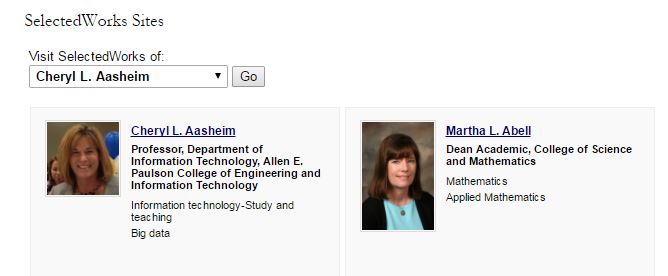

To add a Digital Commons Author Search URL to a PlumX Researcher Profile:
- Sign in with your PlumX admin credentials and locate the author in the list of PlumX Researchers.
- Click on Show All to see a complete list.
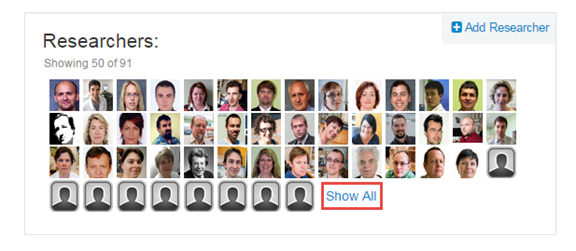
- If the author for whom you are searching doesn’t have a PlumX Profile, click on Add Researcher to create the new profile.
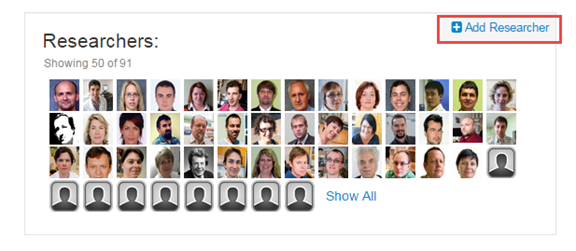
- If you do locate the researcher’s profile, click their picture or their name.
- From within the profile, click on Edit this Profile.

- On the right side of the page, click the Digital Commons label to expand that section.
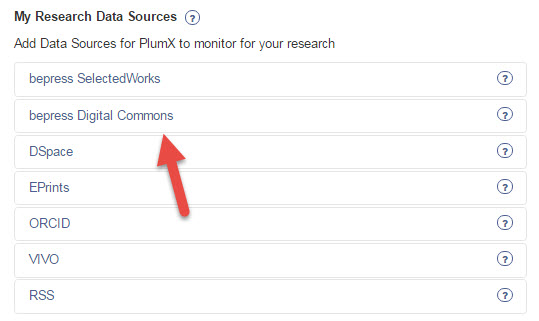
- In the box labeled Author Search URL, enter the appropriate URL.

- Once you find the author for whom you are searching, click on his or her name.
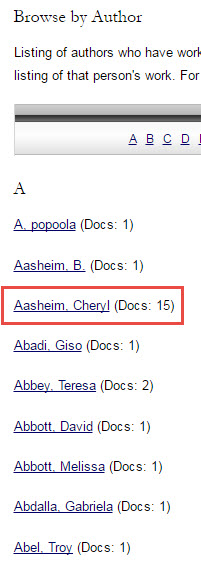
- Copy and paste the resulting URL into the Author Search URL in PlumX.
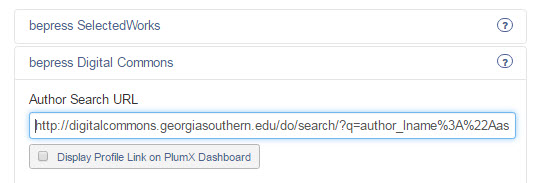
After you save your changes, PlumX will automatically gather the publications for the author(s).